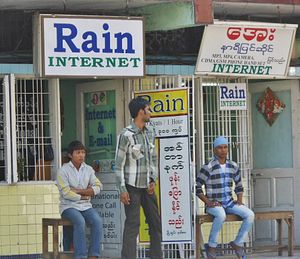If the past two decades of foreign interventionism have taught us anything, it is that democracy cannot be imposed upon a nation unless it has the social, cultural, economic, and institutional architecture to enable it. The same should be said of democratic tools — including a free press, elections, and, of course, civic technologies.
Facebook, Twitter, and WhatsApp were once hailed as disruptive forces set to empower, mobilize, and inform the voiceless in authoritarian states. After all, they were the catalysts behind the Arab Spring movement. But as we’re now seeing, technology’s ability to grow democracy depends wholly on our ability to wield it.
Myanmar — a nation navigating a transition away from military rule toward democracy — offers a perfect example of what happens when the widespread, and rapid, adoption of social media comes before the necessary pre-conditions of development are in place to harness it for good.
Around 90 percent of the Southeast Asian nation’s 55 million population has access to a phone with internet service — that’s on par with global economic giant India. Meanwhile, around 60 percent of Myanmar’s population uses Facebook or other forms of social media to get news. Much this access has come in the space of just a few years. In 2013, only around 10 percent of the population had access to a phone, but reforms led by former President Thein Sein since 2011 — which loosened state control of digital services and the media — led to a dramatic transformation in the nation’s climate of free speech. A 2016 partnership between a state-run telecom company and Facebook then also stimulated the platform’s use on mobile devices.
The changes have been immense. More people have access to news and information than ever, with independent news outlets such as The Irrawaddy, Democratic Voice of Burma, and Eleven Myanmar flourishing with online readers. That, in some cases, has increased pressure on the state, particularly with images and videos emerging from Rakhine state puting military operations against the Rohingya Muslims in the spotlight. The growth of internet access has also expanded civic spaces, allowing people to mobilize and connect faster. For example, it played a big role in spreading State Counsellor Aung San Suu Kyi’s democratic message as her National League for Democracy party was voted into power in November 2015. As such, social media can reap democratic dividends for Myanmar.
But its also comes at a cost. Just as voices for good can be amplified, so too can pernicious ones. The virulent Buddhist nationalism that has long vilified Myanmar’s minorities, particularly its small Muslim population, has gained a bigger platform – and a wider audience. Indeed, extremist monk Ashin Wirathu, once dubbed the Buddhist Bin Laden, rose to prominence via Facebook and YouTube. Through social media, nativist movements like his have been able to spread their rhetoric nationwide, thereby elevating a latent skepticism of non-Burman ethnic groups into a nationwide psyche of hatred.
Indeed, the link between the democratization of online spaces and communal violence in Myanmar is all too evident. Deadly clashes between Buddhists and Muslims in 2012 and 2014 were fed by fake news. During the recent military atrocities, which have seen over 600,000 Rohingya flee to neighboring Bangladesh, both anti-Muslim and Rohingya insurgency sympathizers have used half truths and fake news online to peddle their narratives. As such, social media platforms can play a major role in feeding rumor mills that drive conflict in divided societies.
What’s more, many forget that social media is not just a tool for civilians. The government too has capitalized, using the platform to communicate its policies more effectively and directly. But, of course, that means it can also be exploited for propaganda purposes. State-funded media outlets — such as The Global New Light of Myanmar — are growing in stature online. Official government pages have fed the story that the military’s violent crackdown on the Rohingya is justified, despite it actually being disproportionate and indiscriminate. Meanwhile, Suu Kyi’s office has brandished some Rohingya atrocity stories as fake. Many civilians buy the government’s line.
And just as Facebook can expand freedom of speech, it can elevate the ability of the government to police and clamp down on personal expression. Over 70 people — including bloggers and journalists — have been charged by Suu Kyi’s government for online posts and comments that have been deemed defamatory to the state or military. In this way the platform can act as a useful means for authoritarian rulers to weed out dissenting voices.
In order for NGOs and international organizations to harness the power of social media for good, its introduction must also go hand-in-hand with education. Citizens need to learn how to distinguish fact from fiction, and to be critical of various narratives. They can also be taught social media best practices, including fact-checking, and how to raise the accountability of politicians by reporting bribes through anonymous online forums. This can all help to assuage the harms, and maximize the benefits, of social media. As for ameliorating its use by governments, that is a case of political will.
Looking back, given how toxic social media is already making politics in the West, it seems negligent to freely introduce it to nations, like Myanmar, where visceral ethnic tension already exists, and where civic discourse and basic information literacy is nascent.
With the rapid explosion of technology, the developing world is leapfrogging an essential part of democratization. Unless a culture of civic discourse is established, alongside a sufficiently educated populace, the likes of Facebook, Twitter, and WhatsApp may just add fragility to already weak states.
Tej Parikh is a global policy analyst and journalist. He received his master’s degree from Yale University with a focus on state building, political economy, and conflict. He runs The Global Prism, an international affairs platform. He tweets @tejparikh90.

































